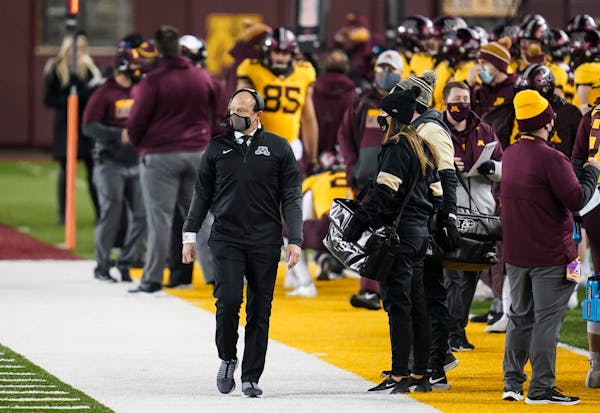The Gophers' upcoming Saturday opponent entered the weekend with the highest-scoring offense and stingiest defense in the Big Ten Conference. And for a precarious Gophers team, that's a formidable challenge in reclaiming the Axe.
But the Gophers might not even have to encounter Wisconsin, the reigning Big Ten West champion, at all this season if they can't control their COVID-19 spread.
When the Gophers faced Purdue on Friday, scraping by with a 34-31 win, they did so without more than 20 players from a combination of injuries and positive COVID-19 tests. The game still went on at TCF Bank Stadium, though Gophers coach P.J. Fleck said it was a "close" call.
The Gophers athletics department only releases testing updates at the end of the month and does not specify between players and staff or by sport. Fleck has declined to name specific players who have tested positive but has intimated as much, including for several early season absences among the kickers and punters.
A team spokesman did not return a request for comment on additional football personnel updates and how that might affect Saturday's trip to Camp Randall. The most recent athletics department update for testing through October accounted for 160 positives from 9,846 tests since June. Both men's and women's basketball teams also recently had to shut down practices with COVID-19 issues.
The Gophers have named coaches who have tested positive in-season, including defensive coordinator Joe Rossi, who missed the Illinois game, and offensive line coach Brian Callahan, who tested positive last week and sat out the Purdue game. Two other unnamed staffers also tested positive last week, per a team release.
As far as players, cornerback Benjamin St-Juste tested positive ahead of the Iowa game a week ago. Others are unknown. Per Big Ten policy, players who test positive sit out 21 days for isolation, cardiac testing and general recovery. Coaches take 10 days.
"That's very hard for those players to get that phone call. It's really hard," Fleck said, adding players aren't always being irresponsible if they contract it. "They put so much into this, and next thing you know, you're out 21 days. … There's not many games, so it can be devastating."
Fleck said he was hopeful some players would soon return after sitting out their three games. It's unclear who might be on that precipice, though, considering the Gophers do not share when exactly anyone tests positive. Rossi said he tested positive Nov. 1.
The Big Ten's protocols specify exact situations for when games and practices cannot go on as scheduled. Each team takes a seven-day rolling average of the positivity rate from total tests administered and team positivity rate.
The Gophers, who test 170 football players and staff every day, would need 60 positive tests of 1,190 total administered in a week, plus 13 positive players and/or staff members to be unable to play.
They could, though, cancel the Wisconsin game even without reaching that threshold, as Wisconsin actually did earlier this season. If a team nears those numbers — as in anything above 24 positive tests in a week and six positive players/staff for the Gophers — they have to "proceed with caution and enhance COVID-19 prevention (alter practice and meeting schedules, consider viability of continuing with scheduled competition)" per the Big Ten's release.
The Badgers had six players and six coaches test positive, including head coach Paul Chryst and starting quarterback Graham Mertz, ahead of their second game against Nebraska and canceled. They again sat out the Purdue game when the outbreak grew to 27 total cases the next week and only just returned the past two weeks.
But Wisconsin can't afford to miss any more games, as teams need to play at least six in the eight-week regular season to qualify for the Big Ten Championship Game. The only way the team could qualify with fewer is if the entire conference's average number of games played dipped below six. Then teams would need just two fewer games than whatever that average is.
Some teams have canceled games with days' notice, but the Clemson-Florida State game Saturday went kaput just hours before kickoff. COVID-19 has postponed or canceled more than 80 games across college football this season. Other conferences that started seasons earlier and have schedule flexibility are trying to reschedule. But the Big Ten started later after initially canceling the season and doesn't have any room if it wants its teams to still be eligible for the College Football Playoff.
Fleck said he's continuing to work with his administration as well as the Big Ten, Minnesota Department of Health and CDC to stop the spread on his team, including continuing to wear masks, wash hands, social distance, only gather for football practice and forgo a social life.
After the Purdue game Fleck said he had only 61 of 85 scholarship players available, and the coach admitted this has been one of the hardest years on the job, one that has challenged his patience and nerves with all the twists and turns.
"But that's 2020," Fleck said, adding he has learned to be a better person from this experience. "And hopefully we can continue to keep those [positive COVID-19] numbers really low."




